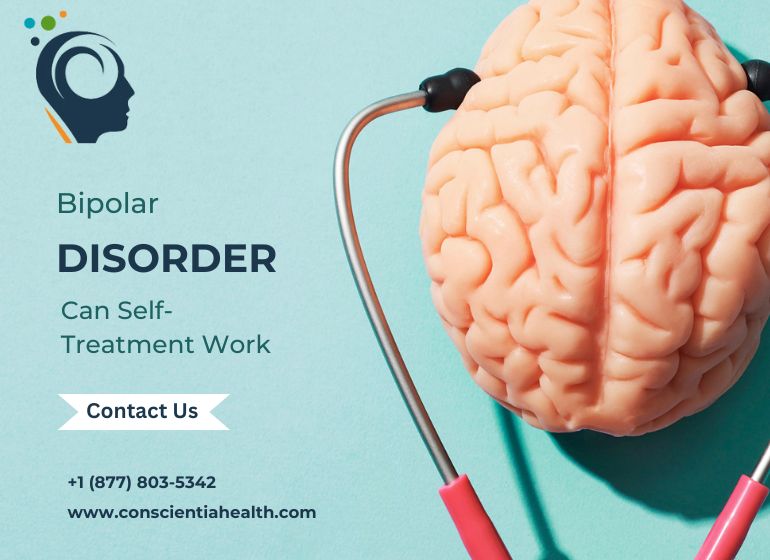Living with bipolar disorder is a journey that involves managing fluctuating moods, from the highs of mania to the lows of depression. Traditional treatment often includes medication, therapy, and lifestyle changes. However, many individuals wonder if self-treatment can be effective. At Conscientia Health, we believe in empowering individuals with knowledge and tools to manage their health. This blog post explores the potential of self-treatment for bipolar disorder and offers guidance on navigating this complex condition.
Understanding Bipolar Disorder
Bipolar disorder is a mental health condition characterized by extreme mood swings that include emotional highs (mania or hypomania) and lows (depression). These episodes can impact daily functioning and overall well-being.
Key Symptoms
-Mania/Hypomania: Increased energy, euphoria, irritability, racing thoughts, decreased need for sleep.
- Depression: Persistent sadness, fatigue, hopelessness, loss of interest in activities, changes in sleep and appetite.
The Role of Professional Treatment
Professional treatment for bipolar disorder typically includes:
- Medication: Mood stabilizers, antipsychotics, and antidepressants.
- Psychotherapy: Cognitive-behavioral therapy (CBT), psychoeducation, and family therapy.
- Lifestyle Adjustments: Regular sleep patterns, healthy diet, and exercise.
These approaches are designed to stabilize mood swings and improve quality of life.
Exploring Self-Treatment Options
While professional treatment is essential, self-treatment strategies can complement these approaches. However, it's crucial to approach self-treatment with caution and always in consultation with healthcare providers.
Self-Treatment Strategies
1. Lifestyle Modifications
- Regular Routine: Maintaining a consistent daily schedule helps regulate mood.
- Healthy Diet: Balanced nutrition supports overall brain health.
- Exercise: Regular physical activity can improve mood and reduce symptoms.
2. Mindfulness and Meditation
- Mindfulness Practices: Techniques like deep breathing, meditation, and yoga can reduce stress and promote emotional balance.
- Journaling: Writing about your thoughts and feelings can provide insight and help manage symptoms.
3. Education and Self-Monitoring
- Psychoeducation: Learning about bipolar disorder empowers you to recognize and manage symptoms.
- Mood Tracking: Keeping a mood diary helps identify patterns and triggers.
4. Support Networks
- Peer Support: Joining support groups provides a sense of community and understanding.
- Family Involvement: Educating family members about the disorder can foster a supportive environment.
Potential Risks and Considerations
- Lack of Professional Guidance: Self-treatment should not replace professional advice. Mismanagement can lead to worsening symptoms.
- Medication Management: Never adjust or discontinue medication without consulting a healthcare provider.
- Over-reliance on Self-Treatment: Combining self-treatment with professional care yields the best outcomes.
Balancing Self-Treatment with Professional Care
Effective management of bipolar disorder often requires a combination of professional treatment and self-care strategies. Here are some tips to balance both approaches:
- Collaborate with Healthcare Providers: Regularly update your doctor about your self-treatment practices.
- Set Realistic Goals: Develop a practical self-care plan that complements your treatment regimen.
- Stay Informed: Keep up with the latest research and treatment options.
Conclusion
Self-treatment can play a valuable role in managing bipolar disorder, but it should always be approached as a complement to professional care. By integrating lifestyle changes, mindfulness, education, and support networks with medical treatment, individuals can navigate the complexities of bipolar disorder more effectively. At Conscientia Health, we are committed to providing the resources and support needed to help you thrive on your journey to mental well-being.
Remember, you are not alone in this journey. Reach out to your healthcare provider to discuss the best strategies for your individual needs and ensure a comprehensive approach to managing bipolar disorder.
Contact Us:
Phone: +1 (877) 803-5342
Address: 650 -652 Newark Ave 1st floor, Elizabeth, NJ 07208
To Know More: https://conscientiahealth.com/bipolar-disorder-treatment/





Comments